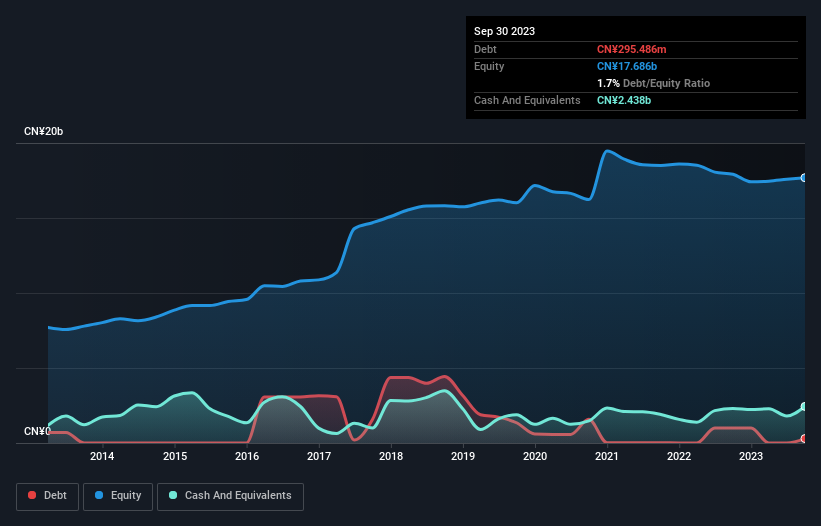- China
- /
- Infrastructure
- /
- SHSE:600004
Health Check: How Prudently Does Guangzhou Baiyun International Airport (SHSE:600004) Use Debt?

Legendary fund manager Li Lu (who Charlie Munger backed) once said, 'The biggest investment risk is not the volatility of prices, but whether you will suffer a permanent loss of capital.' When we think about how risky a company is, we always like to look at its use of debt, since debt overload can lead to ruin. As with many other companies Guangzhou Baiyun International Airport Company Limited (SHSE:600004) makes use of debt. But the more important question is: how much risk is that debt creating?
When Is Debt A Problem?
Generally speaking, debt only becomes a real problem when a company can't easily pay it off, either by raising capital or with its own cash flow. Ultimately, if the company can't fulfill its legal obligations to repay debt, shareholders could walk away with nothing. However, a more frequent (but still costly) occurrence is where a company must issue shares at bargain-basement prices, permanently diluting shareholders, just to shore up its balance sheet. Of course, plenty of companies use debt to fund growth, without any negative consequences. The first step when considering a company's debt levels is to consider its cash and debt together.
View our latest analysis for Guangzhou Baiyun International Airport
What Is Guangzhou Baiyun International Airport's Debt?
The image below, which you can click on for greater detail, shows that Guangzhou Baiyun International Airport had debt of CN¥295.5m at the end of September 2023, a reduction from CN¥1.00b over a year. However, its balance sheet shows it holds CN¥2.44b in cash, so it actually has CN¥2.14b net cash.

How Healthy Is Guangzhou Baiyun International Airport's Balance Sheet?
The latest balance sheet data shows that Guangzhou Baiyun International Airport had liabilities of CN¥6.24b due within a year, and liabilities of CN¥2.84b falling due after that. On the other hand, it had cash of CN¥2.44b and CN¥1.37b worth of receivables due within a year. So its liabilities total CN¥5.27b more than the combination of its cash and short-term receivables.
Guangzhou Baiyun International Airport has a market capitalization of CN¥23.4b, so it could very likely raise cash to ameliorate its balance sheet, if the need arose. But we definitely want to keep our eyes open to indications that its debt is bringing too much risk. While it does have liabilities worth noting, Guangzhou Baiyun International Airport also has more cash than debt, so we're pretty confident it can manage its debt safely. When analysing debt levels, the balance sheet is the obvious place to start. But it is future earnings, more than anything, that will determine Guangzhou Baiyun International Airport's ability to maintain a healthy balance sheet going forward. So if you want to see what the professionals think, you might find this free report on analyst profit forecasts to be interesting.
Over 12 months, Guangzhou Baiyun International Airport reported revenue of CN¥5.3b, which is a gain of 8.5%, although it did not report any earnings before interest and tax. We usually like to see faster growth from unprofitable companies, but each to their own.
So How Risky Is Guangzhou Baiyun International Airport?
Although Guangzhou Baiyun International Airport had an earnings before interest and tax (EBIT) loss over the last twelve months, it generated positive free cash flow of CN¥1.6b. So taking that on face value, and considering the net cash situation, we don't think that the stock is too risky in the near term. Until we see some positive EBIT, we're a bit cautious of the stock, not least because of the rather modest revenue growth. For riskier companies like Guangzhou Baiyun International Airport I always like to keep an eye on the long term profit and revenue trends. Fortunately, you can click to see our interactive graph of its profit, revenue, and operating cashflow.
At the end of the day, it's often better to focus on companies that are free from net debt. You can access our special list of such companies (all with a track record of profit growth). It's free.
New: Manage All Your Stock Portfolios in One Place
We've created the ultimate portfolio companion for stock investors, and it's free.
• Connect an unlimited number of Portfolios and see your total in one currency
• Be alerted to new Warning Signs or Risks via email or mobile
• Track the Fair Value of your stocks
Have feedback on this article? Concerned about the content? Get in touch with us directly. Alternatively, email editorial-team (at) simplywallst.com.
This article by Simply Wall St is general in nature. We provide commentary based on historical data and analyst forecasts only using an unbiased methodology and our articles are not intended to be financial advice. It does not constitute a recommendation to buy or sell any stock, and does not take account of your objectives, or your financial situation. We aim to bring you long-term focused analysis driven by fundamental data. Note that our analysis may not factor in the latest price-sensitive company announcements or qualitative material. Simply Wall St has no position in any stocks mentioned.
About SHSE:600004
Guangzhou Baiyun International Airport
Manages and operates Guangzhou Baiyun International Airport in China.
Solid track record with excellent balance sheet.
Market Insights
Community Narratives



